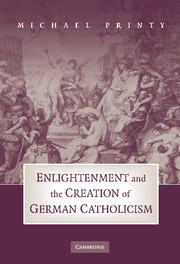1 - Introduction
Published online by Cambridge University Press: 02 July 2009
Summary
NATION AND RELIGION IN THE GERMAN ENLIGHTENMENT: A NEW PERSPECTIVE
Enlightenment and the Creation of German Catholicism tells the story of how eighteenth-century German Catholics rethought the church. They imagined a church independent of, though still in communion with, Rome. Led by educated, “Enlightened” German Catholics in partnership with the state, the church they envisioned would solidify the link between religion, civilization, and morality. The reform program of this cohort of educated bourgeois Catholics represented the culmination of several generations of pious renewal and religious reform. As such, it was part of a broader Catholic Enlightenment throughout Europe. But reform Catholicism in Germany had its own dynamic and set of problems that distinguished it from other such programs in the Catholic world. The most important of these were the political fragmentation of the Holy Roman Empire, the vitality of popular Baroque Catholicism, and the biconfessional nature of German society. Educated German Catholics sensed that the church needed to be strengthened against a series of interrelated threats. Religion's “cultured despisers” (in Schleiermacher's terms) were increasingly vocal in their attacks on revealed religion. The political structure of the Holy Roman Empire – which provided the institutional guarantee for the Catholic church in Germany – was menaced by the rise of Prussia. Protestants were constructing a powerful narrative that emplotted German nationalism as a rejection of Roman Catholicism.
- Type
- Chapter
- Information
- Enlightenment and the Creation of German Catholicism , pp. 1 - 22Publisher: Cambridge University PressPrint publication year: 2009
- 1
- Cited by

